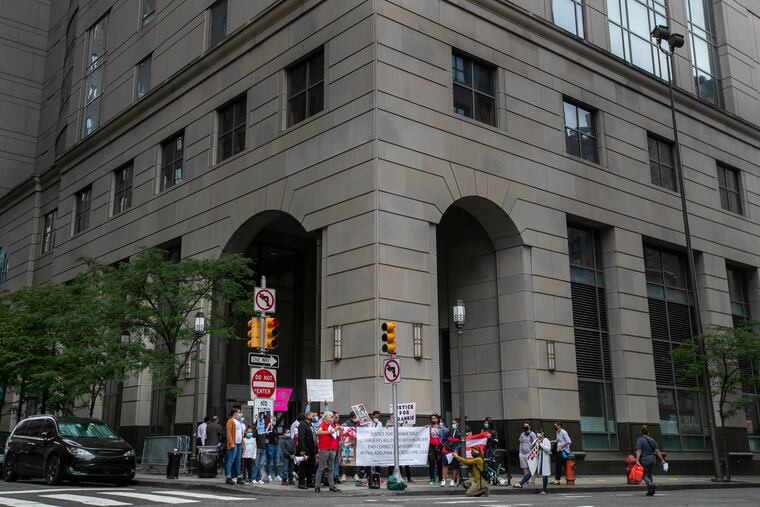Defense lawyers say Philly courthouse could become a coronavirus hot spot and is not ready for jury trials
Philadelphia lawyers are raising concerns about the safety of the ventilation system in the Stout Criminal Justice Center as the building reopens after being shuttered since March due to Covid-19.

Philadelphia courtrooms, where a growing number of jurors will weigh evidence during criminal trials this fall, could become “super-spreader” sites for the coronavirus, according to a coalition of defense lawyers who have asked officials to slow down plans to fully reopen the main courthouse.
Now that the Stout Center for Criminal Justice is operating at limited capacity with few people in the hallways things are fine. But the ventilation system in the building, notorious for crowded corridors and elevators, will not be able to handle the virus load when it opens at capacity, the lawyers said in two letters sent to court officials.
“The ventilation issue is a significant one. The system is not adequate to filter out the virus that is causing COVID-19. It’s the bare minimum, and it is essentially pushing around stale air,” said lawyer James A. Funt, a member and former chair of the executive committee of the Philadelphia Bar Association’s criminal justice section.
Funt is one of eight lawyers who sent an Aug. 28 letter to leaders of the First Judicial District outlining their concerns with the 26-year-old Center City building’s heating, ventilation, and air-conditioning, among other issues.
The Stout Center shut down in mid-March like most city government buildings due to the spread of the coronavirus. Earlier this month, a small number of in-person hearings began, as did the first jury trial.
Marc Flood, the district’s court administrator, responded Sept. 4, noting that court personnel will ensure safe distancing and jurors will receive temperature scans and have the use of a dedicated elevator. He also said acrylic glass barriers are being installed in courtrooms.
“However, even as we begin to increase the number of cases we hear in-person, no one will be asked to go into any courtroom that is not yet equipped with a physical partition,” Flood wrote.
But he did not address concerns related to the building’s air flow, the lawyers charged in a follow-up letter Monday.
“An HVAC system that only forces stale air through the building makes the problem worse, not better, because it merely circulates a speaker’s viral load across an entire courtroom. … We are not asking the [building’s] HVAC technicians to do the impossible. We are merely urging the leadership to acknowledge that without adequate ventilation and filtration, the risk represented by in-person jury trials is too high at this time,” the lawyers wrote.
The lawyers said in addition to holding off on jury trials, more court proceedings should be done by video or even held outside. They noted that during the 1918 influenza pandemic, New York City schoolchildren were taught outside in the winter.
“Masks, sanitizers, and barriers are important, but they alone will not protect us from aerosolized coronavirus. These remedies must be implemented in conjunction with a real plan for the air. Without such a plan, the building remains unsafe,” the lawyers said.
Defense attorney Michael Coard, a member of the Stout Reopening Committee and signer of both letters, said he applauds the efforts that judges and court officials have made, while he remains vigilant about the danger.
Coard said he signed the letters “because I fully support those proposals primarily because, due to systemic racism, Black people are disproportionately affected by COVID and by stop and frisk, arrests, prosecutions, convictions, and mass incarceration."
Gabriel B. Roberts, the courts' director of communications, said documentation was provided to the lawyers indicating the HVAC system at the Stout Center performs the recommended number of air exchanges.
He noted that while cases are now being heard in person, the courthouse is still “generally” closed to the public.
“Court leadership continues to require that masks be worn while in the building," Roberts said. The judicial district enforces the state mask mandate.
“The court will continue to evaluate efforts to expand operations on a moment-by-moment basis and remains ready to adjust operations as [and] when needed,” Roberts said.
In addition to Funt and Coard, signers of the letters were: Kathryn Cacciamani, on behalf of court appointed attorneys; Lauren Fine, cochair of the executive committee of the Philadelphia Bar Association’s criminal justice section; Alexandre Turner, chair of the Philadelphia chapter of the Pennsylvania Association of Criminal Defense Lawyers; Ronald Greenblatt, a member of the defense lawyers group; and Susan Lin and Troy Wilson of the Bar Association.